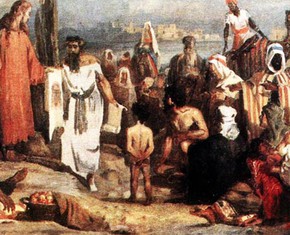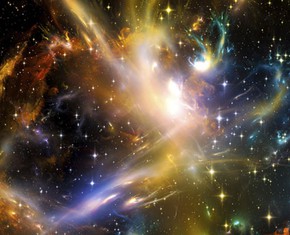The views expressed in our content reflect individual perspectives and do not represent the authoritative views of the Baha'i Faith.
Like most religions, the Baha’i Faith asserts that the Creator has sent prophets or messengers to teach and guide humankind.
Where some religions ascribe a variety of spiritual stations and capacities to these messengers, the Baha’i teachings are unambiguous about their nature and purpose. Referring to these messengers as “manifestations of God,” Baha’u’llah, the prophet and founder of the Baha’i Faith, wrote:
The essence of belief in Divine unity consisteth in regarding Him Who is the Manifestation of God and Him Who is the invisible, the inaccessible, the unknowable Essence as one and the same. By this is meant that whatever pertaineth to the former, all His acts and doings, whatever He ordaineth or forbiddeth, should be considered, in all their aspects, and under all circumstances, and without any reservation, as identical with the Will of God Himself. This is the loftiest station to which a true believer in the unity of God can ever hope to attain. Blessed is the man that reacheth this station, and is of them that are steadfast in their belief.
RELATED: What is Revelation?
This understanding of terminology goes a long way toward clarifying both the concept of what precise purpose these messengers serve and what makes them distinct from other important figures in religious history who, while influential and meritorious, do not possess the status or overall function as do these divine educators in carrying out the Creator’s desire to be known and loved.
The Hindu Concept of Divine Intermediaries
The Hindu Faith, perhaps the oldest continuing religious tradition, portrays God (or Vishnu) as sending a sequence of avatars, the ten most important of which are thought to incarnate the virtues of Vishnu, or else to be literal incarnations of Vishnu Himself. The best known of these intermediaries are Krishna and Buddha, though the mythic traditions and variations of belief within both Hinduism and Buddhism hardly support a unified or consistent portrayal of some standardized theology or a consistent view of religious history.
The Judaic Concept of the Prophets
The portrayal of intermediaries or prophets in the Torah (or Pentateuch) is distinct from the way in which these same figures are described later in the Qur’an. According to the Old Testament, the prophets of Judaic religious history, particularly the antediluvian patriarchs Adam and Noah, are perceived not so much as divine emissaries as they are ordinary human spiritual leaders to whom God gave explicit instructions. The later central prophets of Judaism – Abraham and Moses – are also portrayed as extraordinary religious leaders directed by God, but not as divine beings sent from the spiritual realm. The traditions of Judaism portray them as fallible individuals whom God anointed to carry out specific missions. After this transformative anointing, these figures assume leadership based on incremental guidance given to them directly by God.
In the Old Testament this process is portrayed in literal terms. God speaks directly to these individuals and explains exactly what they should do and how they should go about accomplishing their tasks – and though they may have been chosen because of some inherent capacity or nobility of character, they are sometimes portrayed as being relatively clueless about their station or purpose until God reveals Himself bit by bit. Furthermore, they are inclined now and again to become impatient and evoke God’s wrath and punishment, or so the chronicles of these events would have us infer.
The Christian Messianic Belief
In the majority of interpretations of Christian theology, the principal intermediary between God and humankind is God Himself. According to the Trinitarian doctrine, God temporarily assumes the guise of an ordinary human being, Christ (the messiah or “Anointed One”). God, in the form of an ordinary human persona, thereby fulfills the prophecies regarding the advent of the messiah, bringing the new law, and sacrificing Himself on the cross as recompense or atonement for the sins of humankind that began with the fall of Adam and Eve (humankind) from grace.
According to most Christian belief, particularly as discussed in Paul’s letters, the prophets of the Old Testament are still important spiritual leaders, but their function historically was to prepare people for the advent of the “savior,” the messiah who would effectively set things right for all time. From this Christian perspective, Judaism was a part of God’s plan, but the ultimate expression of God’s intervention in human history is the advent of Christ. Likewise, the conclusion of human history, according to many interpretations of Christ’s words about his return, together with the symbolic expressions of eschatology in the Revelations of St. John the Divine, will be the last judgment that will occur with the second coming of Christ at the time of “the end.”
RELATED: Does Every Culture Have its Own Religion?
The Islamic Concept of the Messengers
Islamic belief as set forth in the Qur’an establishes a very clear distinction between the prophets or apostles of God, and God Himself. This is possibly the foremost theme of the Qur’an – the absolute supremacy of God the Creator. All besides God is created by Him and functions according to His will.
Muhammad repeatedly alluded to the plan whereby God sends a sequence of divinely empowered apostles or messengers of God, all of whom are of equal status and rank, but each of whom has a specific part to play in the ongoing spiritual enlightenment and education of humankind. Therefore, frequently throughout the Qur’an Muhammad lists these intermediaries and sometimes describes the trials and tribulations they endure when, ironically, they are rejected by the very people to whom they are sent in fulfillment of prophecy.
Muhammad observed that in spite of the proofs of their station and their capacity to reveal guidance, these messengers suffer, are rejected, and only later are appropriately recognized, most often because of the salutary influence their advent has manifested among the peoples who become influenced by their teachings. Furthermore, according to the Qur’an, Adam is not an ordinary human being who sins against God, but is one of these divinely empowered messengers sent by God to teach humankind the “names” or spiritual attributes manifested in all created things.
A Baha’i Understanding of the Manifestation
The Baha’i Faith amplifies and further clarifies the description in the Qur’an of the divinely created process by which the Creator uplifts and educates humankind. First, the term “manifestation” is employed in addition to the Islamic term “messenger” to emphasize the fact that these specialized spiritual emissaries are not ordinary human beings, but an order of representatives from the divine realm who perfectly incarnate or “manifest” all the attributes of God – but are not of the same “essence” as God. That is, they are not incarnations of God Himself, but of His qualities.
Second, Baha’u’llah explains that this process has existed ever since the emergence of humankind on Earth, and will continue so long as Earth endures.
In this sense, no manifestation is individually superior to another in rank or capacity. But because this continuous revelation creates an ongoing educational program throughout history, each successive manifestation necessarily sums up all that has preceded him, and then takes the process a stage further. It is in this sense that each manifestation “seals up” or is the “end” or culmination of all that has gone before, and yet is the “beginning” of a new revelation, another stage in human development.
It is in this context that Christ says He is the “alpha and the omega” (Rev 1:10), and Muhammad observes similarly that he is the “first Adam.” Here, from his Book of Certitude, Baha’u’llah explained:
These Manifestations of God have each a twofold station. One is the station of pure abstraction and essential unity. In this respect, if thou callest them all by one name, and dost ascribe to them the same attributes, thou hast not erred from the truth. Even as He hath revealed: “No distinction do We make between any of His Messengers”[2:285]. For they, one and all, summon the people of the earth to acknowledge the unity of God, and herald unto them the Kawthar of an infinite grace and bounty. They are all invested with the robe of prophethood, and are honored with the mantle of glory. Thus hath Muhammad, the Point of the Qur’án, revealed: “I am all the Prophets.” Likewise, He saith: “I am the first Adam, Noah, Moses, and Jesus.”
















Comments
Sign in or create an account
Continue with Googleor